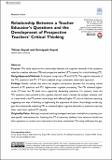Please use this identifier to cite or link to this item:
http://hdl.handle.net/11547/11319Full metadata record
| DC Field | Value | Language |
|---|---|---|
| dc.contributor.author | Soysal, Yilmaz | - |
| dc.date.accessioned | 2024-03-15T08:03:10Z | - |
| dc.date.available | 2024-03-15T08:03:10Z | - |
| dc.date.issued | 2023 | - |
| dc.identifier.issn | 2096-5311 | - |
| dc.identifier.issn | 2632-1742 | - |
| dc.identifier.uri | http://hdl.handle.net/11547/11319 | - |
| dc.description.abstract | PurposeThis study explores the relationships between the cognitive demands of the questions asked by a teacher educator (TE) and prospective teachers' (PT) capacity for critical thinking (CT).Design/Approach/MethodsParticipants comprised a TE and 32 PTs. The cognitive demands of the TE's questions and PTs' CT were analyzed using a systematic observation approach.FindingsResults indicate that there are tangible connections between the increasing mental demand of TE questions and PTs' higher-order cognitive processing. The PTs achieved higher-order CT when the TE asked more cognitively demanding questions. For instance, when the TE's questions were pitched at the cognitive demand levels-namely, the analyze, evaluate, and/or create levels-the PT answers were longer and reflected higher CT, such as inductive reasoning, suggesting new ways of thinking, or legitimating the arguments of others. Accordingly, results suggest that intentionally subjecting PTs to sustained higher cognitive demands via questions may help them reach their optimal CT capacity.Originality/ValueAlthough proposed teaching strategies have been invaluable in proposing content-specific interventions for fostering the CT of university students, how lecturers should use their questions to conduct such interventions has been overlooked. This study addresses this gap. | tr_TR |
| dc.language.iso | en | tr_TR |
| dc.relation.ispartofseries | 6;1 | - |
| dc.title | Relationship Between a Teacher Educator's Questions and the Development of Prospective Teachers' Critical Thinking | tr_TR |
| dc.type | Article | tr_TR |
| Appears in Collections: | Web Of Science | |
Files in This Item:
| File | Description | Size | Format | |
|---|---|---|---|---|
| soysal-soysal-2022-relationship-between-a-teacher-educator-s-questions-and-the-development-of-prospective-teachers.pdf | 1.17 MB | Adobe PDF |  View/Open |
Items in DSpace are protected by copyright, with all rights reserved, unless otherwise indicated.
